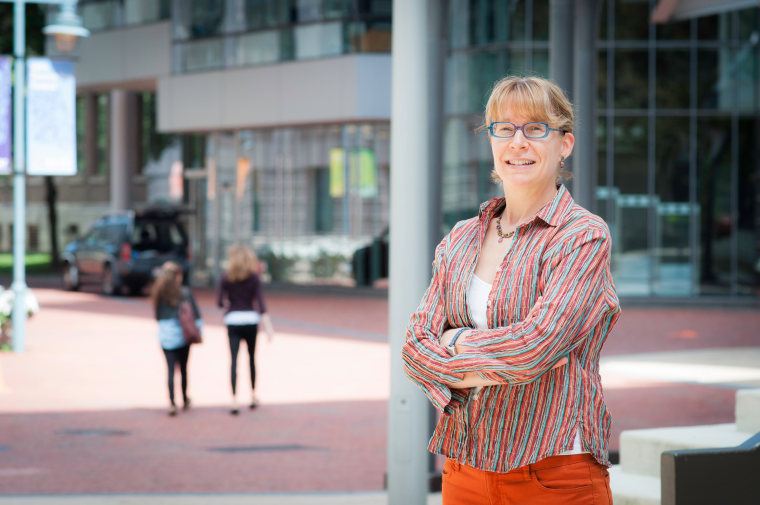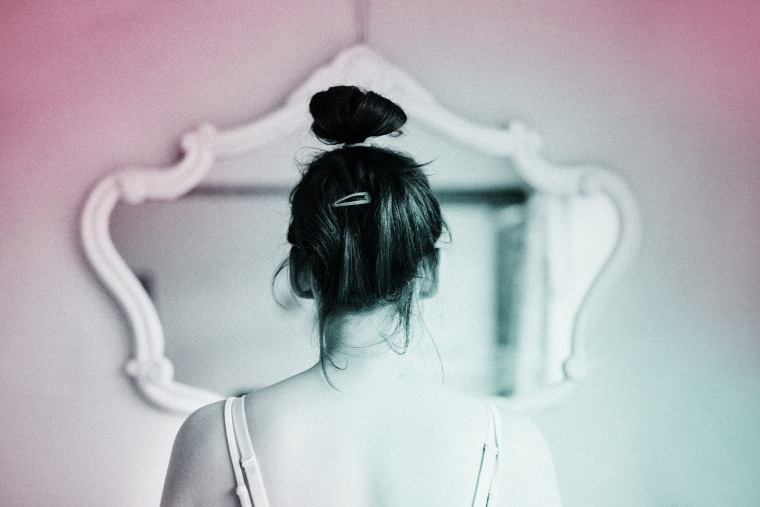I haven’t stepped on a scale in three-and-a-half years. Not at home, not at the doctor’s office. For the first time in literally 40 years, I don’t have the foggiest idea how much I weigh. Yet hardly a day goes by without the scale or my weight entering my thoughts.
Growing up in the south in the 1970s, I was keenly aware at a young age that my own thinness was valued by others. I remember being in high school, showing friends a satin red dress I had bought for prom and asking them if I should try to lose a few pounds before the big night. Never mind that at the time I was a closeted lesbian and my date a closeted gay man. That didn’t seem to protect me from the inescapable pressure on girls to be ever-vigilant about our weight. And those thoughts have stayed with me.
It’s somewhat ironic because I’m a public health scientist dedicated to preventing eating disorders. I have studied and railed against diet culture my whole career. I realize now in retrospect that I had fallen prey to the hubris of many scientists: wishful thinking that if we study a social phenomenon, we are somehow inoculated from its effects. Much to my disappointment — especially in myself — I was forced to admit how insidiously diet culture had infiltrated not just society, but my own sense of self too.

And it doesn’t matter what your age is. In the case of diet culture and appearance-based discrimination, the effect – particularly on girls – has been nothing short of catastrophic.
On Oct. 4, Dove launched their “Real Cost of Beauty Ideals report,” in collaboration with Deloitte Access Economics and my program STRIPED based at Harvard TH Chan School of Public Health, where I work. We found that body dissatisfaction and appearance-based discrimination, including weight and skin shade discrimination, have devastating economic and social consequences for people of all genders, but most especially women and girls.
Our report found that every year, among people aged 10 or older, over 45 million people in the U.S. experience body dissatisfaction so severe and disabling that it affects their mental and physical health, education, and employment. We also found that every year, at least 66 million people in the U.S. experience appearance-based discrimination, which has been linked with a range of unfair practices, from biased grading and disciplinary action by schools, hiring practices by employers and harsher sentencing in the criminal justice system.
And it’s costing us as a society. We found that body dissatisfaction costs the U.S. economy $305 billion per year, made up of $84 billion in financial costs and $221 billion in lost well-being each year. For appearance-based discrimination, our findings were even more disturbing. Combined, weight and skin-shade discrimination cost the U.S. economy $269 billion in financial costs and an additional $233 billion in well-being losses, totaling $501 billion in costs to society each year.
For our study, we gathered data on all the ways that body dissatisfaction and appearance-based discrimination have impacts, whether as individuals, families or employers, in addition to the healthcare system, and government. And then we tallied up the cascading set of costs those impacts incur. For instance, body dissatisfaction and appearance-based discrimination increase the chances someone will develop depression or an eating disorders, and treating these conditions comes with costs to the healthcare system and affected individuals and families. Appearance-based discrimination has been linked through unfair school suspensions and expulsions with young people leaving high school early without a degree and lower educational attainment in the long term, which then can translate into not just lower earnings for individuals and families but also negatively affects the capacity of the nation’s workforce as a whole, which then affects employers and government.
People of color are also disproportionately affected. Girls, women, and people of all genders who may already be struggling with economic precarity have the least resources to buffer the added blow of weight discrimination when it leads to job loss, reduced pay, or missed educational opportunities. Skin-shade discrimination most often leads to unfair and often cruel treatment of people with darker skin shades -- above and beyond the already well-documented effects of other forms of racism on Black and Brown communities.
What is frightening now is how much worse things have gotten for young people. In the years since the introduction of social media, but before the pandemic, studies showed teen mental health was worsening, especially in girls. Then, amid Covid-19, teens had to adapt to a near universal shift online for almost every facet of their lives. The subsequent plummet in mental health was precipitous: Across the country, children’s hospitals and emergency departments were inundated with teens in crisis, with eating disorders cases doubling among teen girls, compared to pre-pandemic rates.
For many young women, being online so much placed them in the crosshairs for algorithms serving up an incessant stream of denigrating and dangerous content: Ubiquitous fat shaming commentary and advertising, toxic diet pills claiming to offer a quick fix, and dieting tips that can fast become pro-ana posts promoting eating disorders.
We must break this cycle across all age demographics.
It’s part of the reason that three-and-a half years ago, I decided that I would refuse to be weighed at the doctor’s office (unless a time came when it was urgently medically necessary). I was not motivated by any new evidence or insights about the pervasive harms caused by diet culture and appearance-based discrimination. Instead, what motivated me was my own hypocrisy. Up to that point, I had frequently extolled others to free themselves from diet culture and reject the scale. Yet, I knew that privately, I had been practicing all the same self-surveillance I spoke against. If I encouraged others to marshal the courage to say “no” each and every time a medical provider asked them to step onto the scale, then I had to also deal with the discomfort of refusing to be weighed. So I did, and it still feels awkward, but I do it and hope that by my doing this, it is creating more space for women of all sizes to do the same.
But I won’t stop there in advocating for basic rights and justice for girls and women and people of all genders. We should be encouraged by signs of progress as a direct result of women-led advocacy: In both California and New York, bills have passed the state legislature and are awaiting the governor’s signature to ban the sale to children of toxic over-the-counter diet pills – the same noxious products that are promoted to girls everyday over social media. Also this year, momentum has been building for legislation to prohibit unfair discrimination based on weight, and advocates are making progress in three states (New York, Massachusetts, and New Jersey) plus New York City. Signs are looking promising that in the next couple of years at least one of these bills will make it across the finish line, setting a precedent for other states to follow. As for that scale, when they come up with one that measures justice instead of pounds, that will be the next one I’ll step up to.
S. Bryn Austin, ScD, is Professor of Social and Behavioral Sciences at the Harvard T.H. Chan School of Public Health and Boston Children’s Hospital. She is the Director of the research and training program Strategic Training Initiative for the Prevention of Eating Disorders: A Public Health Incubator (STRIPED www.hsph.harvard.edu/striped), based at the Harvard Chan School and Boston Children’s Hospital.
